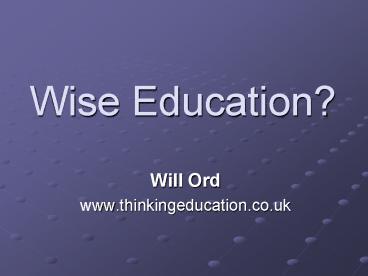Wise Education - PowerPoint PPT Presentation
1 / 19
Title:
Wise Education
Description:
Wise Education? Will Ord. www.thinkingeducation.co.uk. Aims ... Over prescriptive, content heavy, test riddled, clever-focused' ... Will Ord: www. ... – PowerPoint PPT presentation
Number of Views:56
Avg rating:3.0/5.0
Title: Wise Education
1
Wise Education?
- Will Ord
- www.thinkingeducation.co.uk
2
Aims
- Where are we going?
- A helpful pedagogy P4C
- A practical technique
3
Key emergent directions
- Away from
- Over prescriptive, content heavy, test riddled,
clever-focused aims - Towards
- skills and pupil oriented, more flexible,
community related, with wise-focused aims and
means.
4
Education is to learning as tour groups are to
adventure.
- RS Wurman
5
Indications of Change
- 2020 Vision personalised learning
- ATL Union paper Subject to Change New
Thinking on the NC - Every Child Matters
- QCA Reviews
- Ofsted Inspections
- Initiatives (14 19, EL, SL, Thinking Skills,
Assessment for Learning, Learning to Learn etc.) - Ongoing calls from employers
- Call from the present addicted, alienated
children - Call from the future clever is not enough
6
Indications of Change
- 2020 Vision personalised learning
- ATL Union paper Subject to Change New
Thinking on the NC - Every Child Matters
- QCA Reviews
- Ofsted Inspections
- Initiatives (14 19, EL, SL, Thinking Skills,
Assessment for Learning, Learning to Learn etc.) - Ongoing calls from employers
- Call from the present addicted, alienated
children - Call from the future clever is not enough
7
topics
skills
8
Skills Dispositions
- Developing Skills observing, responding,
investigating, questioning, researching,
analysing, synthesising, interpreting, imagining,
reflecting,, evaluating, applying, expressing
etc. - Developing Dispositions Consider evidence and
argument, change views, collaborate, seek for
truth, recognise feelings, listen, live with
uncertainty, reflect on own beliefs / experience
/ values, empathise, tolerate, assist others etc.
9
Philosophy for Children
- 35 years of R D. Not a wheeze.
- skills student orientated
- practised in 60 countries
- Strongly supports Primary / KS3 Strategy, TS, EL,
SL, Speaking Listening, assessment for
learning, learning to learn, personalised
learning etc - raises results very significantly - research
- for all subjects, ages, and abilities.
10
Sample research results
- 88 Yr 6 children exceeded teacher predictions
for KS2 Reading - 24 rise in Maths GCSE predicted grades
- Marked improvements in CAT scores (6 point
average, across ability range) - Pupil teacher recognition of significant
advances in emotional literacy, social behaviour,
and confidence.
11
Some Key P4C Principles...
- Dialogue pupil to pupil progress
- Facilitator guide on the side, not a sage on
stage - Community of Enquiry their questions and
motivation - Thinking communication skills
12
(No Transcript)
13
(No Transcript)
14
General P4C Scheme
- Stimulus
- Private reflections
- Sharing, and question creation
- Airing questions
- Voting for an enquiry question
- Enquiry
- Reflections on process / content
- Last words
15
Questions thinking
- abc abd
- mno mn?
16
mn?...
- p (end of thinking)
- d,q,1, reversed n, u, anything, m, l (etc.!)
17
Questions seeking clarification Can you explain
that...? What do you mean by...? Can you give me
an example of...? How does that help...? Does
anyone have a question to ask about that idea?
Explaining, defining, giving examples,
supporting, enquiring Questions that ask for
reasons and evidence Why do you think that...?
How do we know that...? What are your reasons
for...? Do you have evidence of...? Can you
justify your opinion? Forming an argument,
assumptions, reasons, evidence Questions that
explore alternative views Can you put it another
way...? Is there another point of view...? What
if someone suggested that...? What would someone
who disagreed with you say? What is the
difference between that view and...? Re-stating
a view, speculation, distinctions, alternative
views Questions that test implications and
consequences What follows (what can we work out)
from what you say? Does that view agree with what
was said earlier? What would be the consequences
of that? Is there a general rule for that? How
would you test to see if that was true?
Implications, consistency, consequences,
testing for truth Questions about the question
or dialogue What kind of question is that? How
does that help us with the question we are
asking? Where have we got to with our question?
Can someone summarise our progress so far? Are we
any closer to answering our question? Where did
we get stuck with the question? What should we
change about how we explore our next enquiry?
Questioning, analysing, connecting, summarising
18
More info
- SAPERE (P4C UK charity)
- www.sapere.org.uk
- Will Ord www.thinkingeducation.co.uk
19
- Education is what survives when we have
forgotten all that we learned. - BF Skinner































